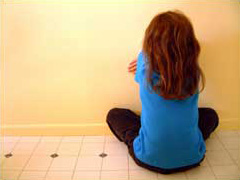
Maybe you’ve had the sudden realization, “I sound just like my mother!” Sometimes we slip into our parents’ parenting patterns without knowing it.
What did your parents do that worked well? Are there things they did that you would like to improve upon in your own parenting?
As we thoughtfully reflect on our experience as children, we might remember pain. We may have been ignored because our parents were extremely busy. We may have felt afraid or alone. Perhaps criticism or yelling or worse characterized our experience.
We should remember that our parents weren’t trained to be parents--and neither are we. We do the best we can with what we know, sometimes perpetuating methods and attitudes that started generations ago.
Confronting our past can be a great step in improving our parenting, making us more thoughtful and aware of negative and positive parenting practices.
Confronting the Past
Confronting our past allows us to examine our childhood experiences objectively and gain empathy for our own children.
We can compare how we were raised with our own parenting methods, and ask ourselves: What worked well? What requires improvement?
It is okay to let go of the style or individual methods our parents used if these are unproductive. We can honor our parents by improving upon the foundation they gave us.
“And at some period of time they will be brought to . . . know of the incorrectness of the traditions of their fathers; and many of them will be saved.”
-Alma 9:17
Would you like to change?
Tune in to Your Children
If we are unsure whether the way our parenting approach is working, ask the children . . . not necessarily by discussing it with them . . . but by observing their reaction to what we are doing.
Are the children withdrawn? Are they eager to share their lives with you? Do you ever see your childhood fears or worries in them, and have a desire to change the way you respond to them as a parent?
Consider This
Evaluating our own childhood includes looking at:
- how we felt in our home
- attitudes we acquired
- approaches used to discipline us
- what and how we were taught
- the amount of time we spent together and what we did with the time
Small Improvements
Identifying areas for improvement can be as simple as choosing one thing you see not working and considering alternatives. Take the idea of “control,” for example. We may have learned from our parents that we can “make” our children behave with threats, punishment or coercion—even though we know from experience it isn’t a pleasant parenting method. What does the idea that “we can control only ourselves” add to this scene? If we can control only ourselves, then what can we change that will give us a better chance of getting more positive behavior from our children?
KISS List
You may want to identify areas for improvement by writing a “KISS” list. KISS stands for “Keep, Stop, Start.” In each category, list specific things your parents did that you want to keep, stop, or things they didn’t do that you’d like to start. Even a sentence or two about why you want to change these things will help you put them into action. Doing this as a couple (each about your own family of origin) can be a great way to get a fresh start on parenting.
Traditions and Transitions
Take a closer look at the “parenting traditions” you were raised with. Were there ideas about control, guilt, or the role of parents or children that you realize were not healthy? Family science calls a person who stops and changes a negative family pattern a “transitional character.” You can be that person by changing the way you interact with your children. You can create your own parenting experience.
Questions and Considerations
We’ve created a list that might help you as you consider the parenting you’ve received. You can use this list or create your own questions. Use your answers to guide you in making any changes you might want.

Taking a look back can be a great way to help us take step forward in our parenting.
Remember saying as an adolescent, “When I’m a parent, I’ll never . . .”? Today you are there. You can use your personal experience with parenting and reassess what you really would like to keep or let go.
By using our past as a framework we can make positive, thoughtful changes for the way we parent our children.